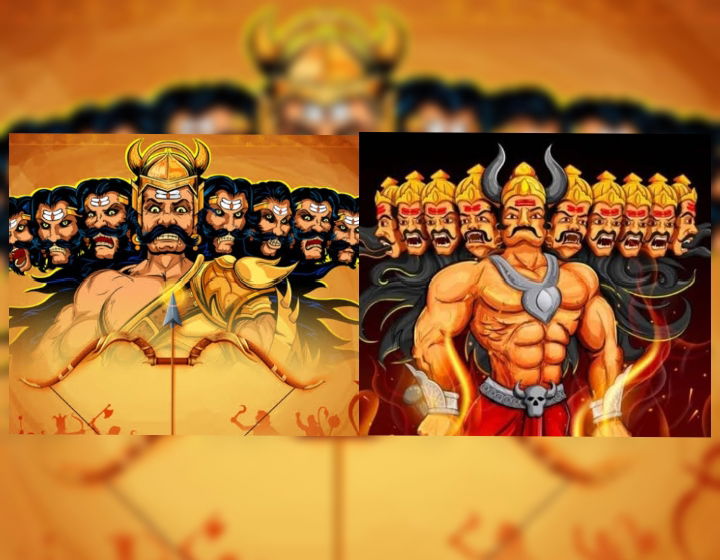Dismantling the myths made about Ravana.


“Ravana is a mulnivasi and we pray our ancestor”, these are some of the claims which are being made by Adharmis. There has always been an attempt to eulogize Ravana and his acts for abducting Ma Sita. Also it’s sad and unfortunate that this attempts is quite successful and even dharmik Hindus is not untouched by the ugly propaganda. Some eulogize Ravana for being Shiva Bhakt, some for his knowledge and some see him with good eyes for not harming the purity of Ma Sita. Many in the contemporary world come up to advocate against the celebration of Dusshera. Let’s crumble down the claims which eulogizes Ravana –
Ravana was a cannibal. He loved eating human meat. He robbed Kubera & became rich. A serial rapist, he raped Rambha, molested Vedavati and several others. He abducted almost every beautiful woman he saw.
In Mahabharata (3.259.27), Ravana is described as पुरुषादकः = eater of Humans.
It is amazing that so many people empathize with this character today.
There is also absolutely zero evidence in Valmiki Ramayana that Ravana was ever a Shiva Bhakta. In Valmiki Ramayana AND Mahabharata, it is nowhere mentioned that Ravana ever worshipped Shiva. The “Shiva Tandava Stotram” said to be composed by Ravana occurs nowhere in these epics.
Whenever Ravana saw any beautiful woman, he used to kill all her family members and abduct her. The women used to cry “Oh death, please embrace me. I cannot take it anymore.”
– Valmiki Ramayana ( critical edition 7.24 ) says :
The first Jauhar known in Indian literature was committed by Vedavati when she found no way out of rapist Ravana’s claws. Valmiki Ramayana (critical edition 7.17) says :
A few remarks regarding Ravana and his alleged “Shiva Bhakti” :
At one instance in Uttarakanda of Valmiki Ramayana, a terrified Ravana recites hymns from Samaveda to pacify an angry Shiva who was almost about to trample him. The motivating factor of Ravana was fear, NOT Bhakti.
The episode of Ravana trying to uplift Kailasha and appeasing Shiva is MISSING in the “critical edition” of Valmiki Ramayana as editors felt this episode was a “late addition”. It is present in some manuscripts of Valmiki Ramayana but completely absent in others.
Apart from this, there is ONLY one instance in the entire Valmiki Ramayana, that too in Uttarakanda (7.31 CE), that Ravana worships Shiva. There is NOTHING anywhere else to even remotely suggest “Shiva Bhakti”. There is no ‘Shiva Tandava Stotram’ anywhere in the Valmiki Ramayana.
Apart from one instance in Uttarakanda, there is NOTHING to even remotely suggest any ‘Shiva Bhakti’ of Rāvaṇa in the entire Vālmīki Ramayana. There is NOTHING to even remotely suggest any ‘Shiva Bhakti’ of Rāvana in the ENTIRE Rāmopakhyana of Mahābhārata.
Far from any “Shiva Bhakti”, Ravana actually battles with Rudras on a number of occasions. For example, at 7.28 of Uttarakanda (Critical Edition) , Ravana actually starts a war with Rudras and showers a lot of weapons on them!
Also, Ravana was never a vegetarian. Here’s an example:
Ravana warns Sita:
“Oh Sita, if you do not accept me as your husband within 2 months, I will K!ll you and eat you for my breakfast”. (Valmiki Ramayana 5.22)
Yes, Ravana was a ritualistic Ahitagni Brahman and a scholar of Vedas. I never disputed that. I have myself talked about how he sang verses from Samaveda.
What I talked about was his selfish to non-existent “Shiva bhakti”, his rapist tendencies and his rakshasa cannibalism. An excerpt from the Ravana Samhita:
Unlike our ancestors, our generation has been extremely divorced from our roots and culture.
Several factors responsible for this state.
And we are also perhaps not at fault. In our busy modern lives, we seldom find time to read up our scriptures which are sole remnants of our ancient culture and heritage. As a result, most of us resort to a more feasible means of consumption. Novels and TV serials.
I have no issue with novels and TV serials. They are doing a great job in disseminating our epic heritage. In doing so, they have exercised considerable artistic liberty. Which is also fine. However, one drawback with an excess of artistic liberty over generations is that the narratives get drifted far away from the historical epics. New narratives become widespread. Several misconceptions arise. Some negative characters become ultimate beneficiaries and acquire a different image altogether. Misinformation and misconception becomes the norm everywhere.
Credit- Trueindology
DISCLAIMER: The author is solely responsible for the views expressed in this article. The author carries the responsibility for citing and/or licensing of images utilized within the text.
